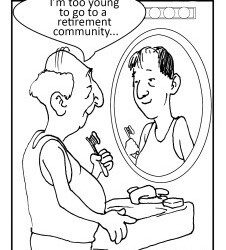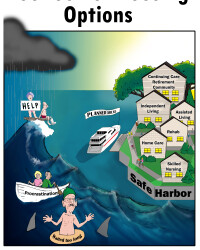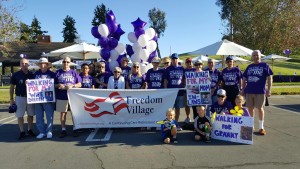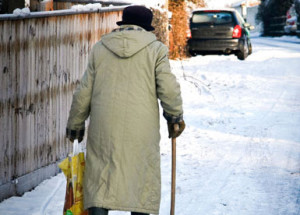by Diane Masson | Dec 20, 2015
A former cop moved into my mother-in-law’s memory care community. He was doing simulated punches to people including the administrator. The administrator was worried the punches might become real, because seniors with dementia do not have good depth perception. Then my sister-in-law witnessed him doing it to my mother-in-law, Amy. She was horrified. My sister-in-law was sitting across from her mom. The former cop came up from behind my sister-in-law and then she saw a fist heading for Amy’s face. The fist stopped six inches away. Here is the weird part. A caregiver witnessed the whole thing, but showed no concern, never said a word, or redirected him. He did walk away and the caregiver accompanied him down the hall. My sister-in-law shouted, “That was not cool,” after them. So the staff started locking residents’ rooms because they caught the former cop standing over sleeping residents. The doors were locked at night so residents could still wander out, but he could not wander in. Something combative must have happened between the former cop and a staff person. They would not say what but my sister-in-law observed that he was gone over a day and then came back drugged. All these situations have transpired over two weeks. My sister-in-law is very worried about Amy. What if she gets up in the night and leaves her room? What if the former cop is out too? Amy will have nowhere to go because every door is locked. A few days ago my sister-in-law discovered the doors to the residents rooms were locked during the day. She shared her disapproval with the administrator....
by Diane Masson | Dec 13, 2015
Meet Betty, a senior resident, who was born in 1926 as a child of the depression. Her life was different back then and every family was very frugal. When she grew up and went to work, ladies wore dresses, hats and girdles. It was just the way of the world back in the thirties and forties. According to Betty, the young people today have not experienced the depression nor the constant thought of frugalness. She said, “Your generation has a freedom that I never had. You have a choice of how to dress at work. It is more casual than in my day. Plus, I would never be able to keep up with the technology. I’m so impressed with the technology and all that you can get done in a short time span.” Betty admires what the workforce of today can accomplish. As she walked into the exercise room at her Continuing Care Retirement Community (CCRC) with her walker, Betty said, “I can’t use all the fancy equipment in here, but I can keep walking. Even when I watch TV, I am walking in place and using my arms and staying active.” She proceeded to show off about four arm exercises that she utilizes. It was a very impressive demonstration. Here’s the best quote from spending time with wonderful Betty: She said, “I can’t stop the years from slipping by. I am just so happy to say that I have had a fabulous life.” What a delight during this time of the year to share a senior’s story. Betty is a senior who has been living at a CCRC...
by Diane Masson | Dec 6, 2015
Last week the Tips2Seniors blog discussed: “Seniors in Denial, Relying on Friends and Family.” Every single one of us knows a senior who is struggling in their home. Some seniors silently suffer and others have a whole network of support from family and friends. Ultimately when a loved one or neighbor tries to have “The Talk” with the senior it can have five typical results: Denial: “I am not ready yet. I am just fine living in my own home.” Shutting down: “I don’t want to discuss this.” Anger: “Why are you questioning my ability to be independent? Leave me alone.” Confusion: “Don’t you want to come see me everyday? I don’t understand.” Acceptance: “I understand that I have become a burden. Maybe it’s time to look at what my senior housing options could be. Will you help me look?” In my 17-year senior housing career, sons, daughters and spouses have asked me the same question, how do I have “The Talk.” Here are my 7 Tips to have “The Talk.” Set the stage for “The Talk”. You know if it is better to have “The Talk” in public or private with your senior. Public talk: Take them out to eat in a public location (so they can’t yell at you or they can’t escape into their bedroom). Private talk: Buy or make your seniors their favorite cookies. Serve the favorite cookies with their special coffee or tea at their dining room table. Tell your senior how much you love them. Then share your concerns, be very factual. Such as: You have fallen twice. You missed your medications three...
by Diane Masson | Nov 29, 2015
Every single one of us knows a senior who is struggling in their home. Some seniors silently suffer and others have a whole network of support from family and friends. Daughters may call their mom once a day to inquire if her senior parent is okay OR no answer could mean they fell again and need help. Result: Senior falls often lead to fractured hips, 911 calls, skilled nursing care with physically therapy and needing 24/7 care. A son may set his senior parent up with medications in a pillbox and then call two or three times a day to make sure his parent has taken them. Result: This can be effective until the senior says, “What are these pills for? I don’t want to take them.” Most family members are not there in person twice a day to make sure the senior ingests the pills. Kind neighbors may make an extra plate of dinner every night and take it to their senior neighbor. Result: Neighbors get frustrated and burned out, spending every single night away from their own family for one year or more. This type of support can’t go on and on. Daughters may spend every other Saturday cleaning mom’s house, grocery shopping and setting up her senior parent to survive for another two weeks. Result: Even if the daughter lives two hours away, this type of help eventually turns into every Saturday. If the daughter works full time, it can never be daily help, then what? What is the answer to a senior struggling to manage in their home? Result: It’s time to talk turkey with...
by Diane Masson | Nov 22, 2015
What should this senior couple do? They sold their home that they could not manage any more and decided to move into an independent rental retirement community in Orange County, California. The couple has an income of $3,600 a month, but their monthly rent is $5,200. (The senior couple’s rent includes three meals a day, wellness classes, entertainment, housekeeping, transportation and etc.) So $1,600 is taken out of their savings for rent on a monthly basis, plus they still have to pay for telephone, Internet, hair styling, car bills, pharmaceuticals, insurances and possibly even gifts and travel. This senior couple is just one example. Their plight is not uncommon. Thousands of seniors are concerned that their meager savings are eroding too quickly. What happens when a senior needs assisted living? How will they afford it? What if one of them has a debilitating stroke and needs long-term skilled nursing? On a nationwide basis, it averages $80,000 a year. Are you aware that board and care homes in Orange County California recently went up $1,000 to $1,500 a month because of the increase to minimum wage? Board and cares are the least expensive options for seniors needing assisted living type care. How will seniors afford the care now? Social security is not increasing for seniors in 2016. Costs for independent living, assisted living, memory care and Continuing Care Retirement Communities will continue to rise as food, utilities and minimum wage goes up. Most of these retirement communities are saddled with a 50 to 100 million mortgage. The residents will be making those interest payments too. Here’s a tip: Ask what the history...
by Diane Masson | Nov 15, 2015
What’s better? What’s the senior housing spin? My mother moved into a not-for-profit Continuing Care Retirement Community. That’s where I started my senior housing career. I sold the not-for-profit status as better and more mission driven than the money grubby for-profits, because that was what all the not-for-profits said and did. I was naive for three reasons, because later I learned: A non-profit board that did not understand seniors or senior housing made financial decisions for the entire senior living community. Most of the profits at the non-profit went towards other ministry work instead of being reinvesting back into the senior community. A resident was sexual abused by a non-profit staff member, even though every employee professed to be Christian. Then my senior housing career switched to for-profit. It can be pretty dog-eat-dog aggressive at some companies. It really varies in the senior living industry if the resident is number one or the stockholders are the primary concern. So you better find out before you consider moving there or working there. If a sales person can’t hit the required sales numbers, you are simply fired at some for-profits. Maybe that’s why so many sales people are impersonal and just want to know if you are ready now? If a senior is not ready now, the sales person has no interest in calling a senior back after they have toured. This is sad, because most seniors need to come back several times before making a decision to move. A relationship needs to be built. At for-profit senior living communities, most financial decisions go towards the benefit of the stockholders. But...
by Diane Masson | Nov 8, 2015
Yesterday, I had the pleasure of hearing Dr. Steven G. Potkin speak about a new Alzheimer’s study to prevent Alzheimer’s at Angel Stadium of Anaheim. Wow, I hope this study is successful. Dr. Potkin said that I could share all the information with you because he is currently seeking senior candidates who are 65 to 85 years of age (with normal memory) for this clinical study on Alzheimer’s disease (AD). He is investigating a new drug intervention that may reduce the impact of a protein known as “amyloid” or “beta amyloid” forming plaques in the brain. Scientists believe that accumulation of amyloid in the brain may play a key role in the eventual development of AD-related memory loss. Dr. Potkin is conducting the research study at the University of California Irvine (UCI) Medical Center in Orange, California. It is called the Anti-Amyloid Treatment in Asymptomatic Alzheimer’s study (the “A4” study for short) for seniors who may be at risk for memory loss due to AD. A senior participant and his or her study partner need to be willing to be part of a three-year study. The study partner (must have frequent contact with the senior participant) would describe changes in the senior participant’s health to the study staff on a weekly basis. There will be a PET scan at the initial screening meeting and at the conclusion of the three-year study to determine whether the senior participant has evidence of an elevated amyloid build-up. Senior participants will also receive monthly study drug infusions. For more detailed information and the total compensation for completing the study, please contact Andrea Weideman...
by Diane Masson | Nov 1, 2015
Here are some tough statements that family members can hear at an Alzheimer’s or dementia care conference for their loved one (who might be residing in assisted living, memory care or skilled nursing care): She can’t direct her own care… Is regularly disoriented… Needs full help with bathing and dressing… She can become frustrated… Can be resistant to care… Does not always remember to use her walker… It can proceed into an in-depth conversation about the ability of your loved one’s communication: She is not very verbal… She has improved in the last four months from not speaking at all (because she was still coming off of the psychotropic medications) to being a little more verbal. The staff has to use phrases or questions that are seven words or less to create less confusion for her. The staffs’ goal is to elicit a “yes” or “no” response, so she can make choices. Then a group discussion can proceed about who she can still recognize and if she can still call anyone by name (this is tough one): Does she recognize you? She thinks her daughter is her sister. How much food is or is not consumed? Our family has experienced witnessing continual weight loss of my mother-in-law for 10 months. She is eating 50% of her food, but can pop out of her chair and start wandering sporadically while dining. She walks almost continually. The staff have problem solved this by feeding her in the country kitchen instead of the dining room to increase her food intake. What should you ask in a care conference? Don’t be intimidated; no...
by Diane Masson | Oct 25, 2015
If enough of us keep walking and raising funds for Alzheimer’s we will eventually find a cure for this detrimental disease that affects so many seniors including my mother-in-law. Almost $110,000 was raised by 741 walkers at the Laguna Niguel Alzheimer’s Walk on October 24, 2015. It was my first time raising awareness for Alzheimer’s in California. I was part of team Freedom Village (a Continuing Care Retirement Community in Lake Forest) who came in seventh for fundraising. My mom had dementia for nine years and died in April. I watched the disease rob her of the ability to communicate. Her last and final roommate in skilled nursing was a wonderful woman who is still battling Alzheimer’s. I rode the bus to and from the Alzheimer’s walk with her husband. He shared the struggle of trying to keep his wife independent as long as possible. He had alarms on the doors to wake him if she tried to wander off in the night. Eventually, those alarms where not enough to contain her at night. He had to find her a safer home. This brilliant husband took his wife one day a week to Silverado memory care to participate in activities. After several months he increased it to two times a week. She was so comfortable there that she would walk in and immediately be engaged with a staff person and walk to an activity. Then the decision was finally made to make it a permanent move. This time the community recommended that he not return for one week, so that his wife could adjust. She did adapt. In her...
by Diane Masson | Oct 18, 2015
Around 12.9% percent of seniors live in poverty in this nation. They can’t ever enjoy a nice retirement or assisted living community with services! It broke my heart to participate in a health fair at a senior center in Riverside, California a week ago. About a 1000 seniors attended. Most seniors were looking for Section 8 or HUD Housing retirement options. What are these options? It’s renting an apartment based on a percentage of their income or a flat fee. It is simply an apartment building that houses seniors. The senior will most likely not have onsite services and support as they age and dementia begins. Subsidized senior housing typically does not offer meals, entertainment, wellness classes, transportation to medical appointments or pay for a senior’s cable TV. It’s disheartening to know that American seniors will be pushed aside to fend for themselves. Why is America trying to save the world and can’t take care of our own seniors? In many states, low-income seniors have no way to afford assisted living. Sure we have Medicaid and Medical when a senior becomes almost completely incapacitated and needs skilled nursing care. What about that in-between step when a senior needs support either physically, mentally, nutritionally or is lost in dementia? What about that intermediate stage when it has become too difficult to grocery shop or cook for themselves. What about when a senior’s arthritic fingers can’t open a jar or button a blouse? Maybe they can rely on family, friends or neighbors? What if they need help at 7:00 AM or in the middle of the night? What if they don’t ask for...
by Diane Masson | Oct 11, 2015
After 200 blog posts of new content supporting the senior housing industry, why am I suddenly cast aside by LinkedIn? Do you think it is fair? In four years, I have helped tons of LinkedIn users join groups and now the groups shun my blogs? Why? LinkedIn and their groups have new rules to stop people from shamelessly promoting themselves. Did LinkedIn protect my quality content when people replied on LinkedIn to my posts with their own self-promotions rather than addressing the question at hand? No! Why is LinkedIn shunning me now? It’s because I am trying to provide resources to benefit the senior housing industry and seniors through links in my articles. One link was to my published book that can benefit seniors and Boomer children in evaluating retirement options. Every human on this planet knows someone who could be helped by learning about, “Your Senior Housing Options.” This is a resource not self-promotion! It took me a year and a half to write it on Saturdays, while I worked full time. I paid my own money to publish this book, because I felt the message would help seniors have a better quality of life by planning ahead. Another link was to my YouTube TV interviews. Every video contains an educational resource topic and explains solutions for seniors and family members in crisis mode. One video is about understanding the differences between a senior staying home and paying a caregiver to help take care of them versus moving to assisted living. Another video explains the differences between rental retirement communities and Continuing Care Retirement Communities. How is this...
by Diane Masson | Oct 4, 2015
First, plan ahead and know that every senior has a 66% chance of needing assisted living or skilled nursing in the future. Second, do not rely on the verbal promises of senior housing sales people. Read the agreement for services or contract. If a senior does not understand it, they should ask a savvy friend or hire an attorney to help them. The majority of retirement counselors are honest and passionate about serving seniors. A few will say “anything” to get a senior to move in immediately. How do you know if a retirement community will really take care of you or not in your future? Here are some important questions to ask EVERY senior housing community BEFORE you move from your home: What happens when a senior needs a higher level of care like assisted living or skilled nursing? Will the senior be asked to leave the retirement community? Do they offer a higher level of care on the same campus? How much does that cost per month? Does an outside company bring caregivers into the senior’s apartment home to provide care? What is the hourly cost? What is that company’s reputation? What happens if a senior falls in the middle of the night? Is there an emergency call system? Who responds to it? Are they medically trained? What happens if a senior falls and he or she can’t hit the emergency button? Will they will be found in a timely fashion? Is there a daily check in system? What happens if a senior outlives their resources? Will they kick you out? A senior provider kicked out a senior in Houston a...


















